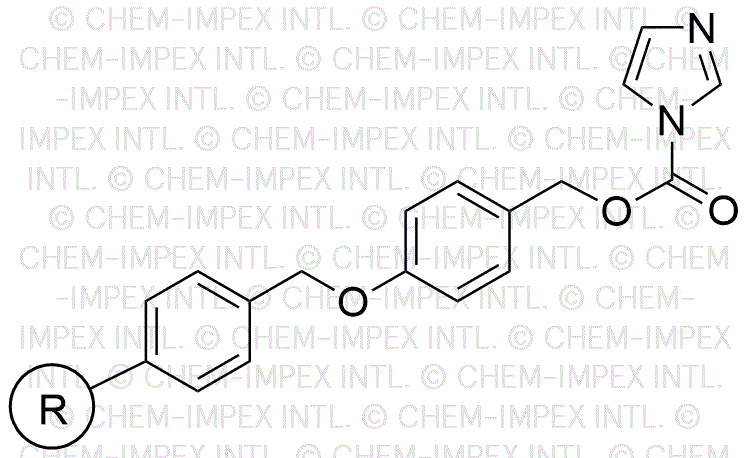Imidazole carbonate Wang resin is widely utilized in research focused on:
- Peptide Synthesis: This resin serves as a solid support for the synthesis of peptides, allowing for efficient coupling reactions and easy cleavage of the final product, which is crucial for pharmaceutical development.
- Drug Discovery: Researchers use this resin to create libraries of compounds for high-throughput screening, facilitating the identification of potential drug candidates in a more streamlined manner.
- Bioconjugation: It is employed in the conjugation of biomolecules, such as proteins and antibodies, enhancing the specificity and efficacy of targeted therapies in cancer treatment.
- Environmental Applications: The resin can be used for the removal of pollutants from water, making it valuable in environmental chemistry for developing filtration systems.
- Analytical Chemistry: This material is useful in chromatographic techniques for separating and analyzing complex mixtures, providing researchers with reliable data for various applications.
General Information
Properties
Safety and Regulations
Applications
Imidazole carbonate Wang resin is widely utilized in research focused on:
- Peptide Synthesis: This resin serves as a solid support for the synthesis of peptides, allowing for efficient coupling reactions and easy cleavage of the final product, which is crucial for pharmaceutical development.
- Drug Discovery: Researchers use this resin to create libraries of compounds for high-throughput screening, facilitating the identification of potential drug candidates in a more streamlined manner.
- Bioconjugation: It is employed in the conjugation of biomolecules, such as proteins and antibodies, enhancing the specificity and efficacy of targeted therapies in cancer treatment.
- Environmental Applications: The resin can be used for the removal of pollutants from water, making it valuable in environmental chemistry for developing filtration systems.
- Analytical Chemistry: This material is useful in chromatographic techniques for separating and analyzing complex mixtures, providing researchers with reliable data for various applications.
Documents
Safety Data Sheets (SDS)
The SDS provides comprehensive safety information on handling, storage, and disposal of the product.
Product Specification (PS)
The PS provides a comprehensive breakdown of the product’s properties, including chemical composition, physical state, purity, and storage requirements. It also details acceptable quality ranges and the product's intended applications.
Certificates of Analysis (COA)
Search for Certificates of Analysis (COA) by entering the products Lot Number. Lot and Batch Numbers can be found on a product’s label following the words ‘Lot’ or ‘Batch’.
Numéro de catalogue
Numéro de lot/série
Certificates Of Origin (COO)
This COO confirms the country where the product was manufactured, and also details the materials and components used in it and whether it is derived from natural, synthetic, or other specific sources. This certificate may be required for customs, trade, and regulatory compliance.
Numéro de catalogue
Numéro de lot/série
Safety Data Sheets (SDS)
The SDS provides comprehensive safety information on handling, storage, and disposal of the product.
DownloadProduct Specification (PS)
The PS provides a comprehensive breakdown of the product’s properties, including chemical composition, physical state, purity, and storage requirements. It also details acceptable quality ranges and the product's intended applications.
DownloadCertificates of Analysis (COA)
Search for Certificates of Analysis (COA) by entering the products Lot Number. Lot and Batch Numbers can be found on a product’s label following the words ‘Lot’ or ‘Batch’.
Numéro de catalogue
Numéro de lot/série
Certificates Of Origin (COO)
This COO confirms the country where the product was manufactured, and also details the materials and components used in it and whether it is derived from natural, synthetic, or other specific sources. This certificate may be required for customs, trade, and regulatory compliance.


